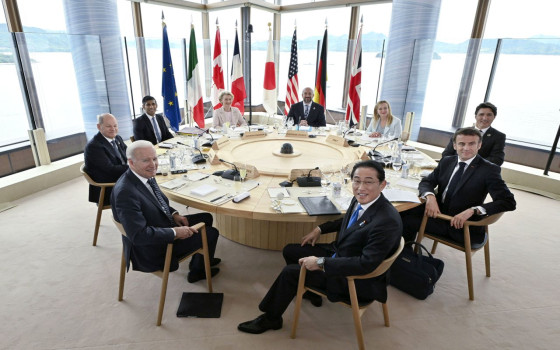
The European Commission on the sidelines of the G7: We will present a stand-alone economic security strategy

- Europe and Arabs
- Saturday , 20 May 2023 13:5 PM GMT
Brussels: Europe and the Arabs
Today, Saturday, the European Commission published excerpts from the speech delivered by President von der Leyen at the fifth session of the Group of Seven summit hosted by Japan, starting yesterday and for a period of three days, and it came in Vonderlein's speech, on economic resilience and economic security:
I am grateful to Japan for placing economic security and economic resilience at the top of the G7 agenda. Japan has been at the forefront on this important but relatively new topic. We can all learn a lot from the Japanese experience.
We want a free and just international order. But we need to be aware of the danger of weaponizing associations.
Next month, the European Commission will propose a stand-alone economic security strategy. The new risks to our economic security will be proportionally and carefully dealt with.
We must stay in constant coordination, because fragmentation is costly and we need predictability for our business. This is why our common response is to reduce risk, not to dismiss.
I very much welcome the G7 statement on economic security. It confirms our willingness to develop safeguards and targeted tools together. We want to remain coordinated to minimize economic risks. So I welcome the creation of the Coordination Panel on Economic Coercion. It's a strong new commitment.
"In a previous session, on the topic of cooperation with partners, von der Leyen said, "The global pandemic and the indirect effects of the Russian war with regard to energy and food have a strong impact on the global economy, but especially on the global south. The same applies to the effects of climate change."
Many emerging and developing countries are looking for sustainable financing opportunities. The Belt and Road Initiative sounded like a good cheap proposition. But many countries in the Global South have had bad experiences with China. They took out Chinese loans and ended up in a debt crisis. All that Russia has to offer these countries is weapons and mercenaries.
That is why many countries in the South are looking for alternative financing options. For the G7 and like-minded partners, there is now a window of opportunity. We must offer win-win partnerships to emerging economies willing to work with us. But we have to be quick and we have to be concrete.
Our big advantage compared to others is the comprehensive package we can offer. We can bring private players and banks around the table. We also focus on creating added value in our partner countries. Because they want to move up the value chains to produce finished and semi-finished products. Therefore, we will support not only raw material extraction but also domestic processing and refining.
The combination of large capital and technology transfer are the two strengths to which the private sector can often contribute. Our role is to de-risk their investments. We've developed new tools for that, like loan guarantees and blends.
Our Partnership for Global Investment and Infrastructure (PGII), which we launched one year ago, is achieving first results. Within the framework of the Global Gateway - the European Union's contribution to PGII - this year we are presenting 90 pilot projects on different continents. We invest in green from hydrogen production, submarine cables or secure satellite connection to railway connections.












No Comments Found